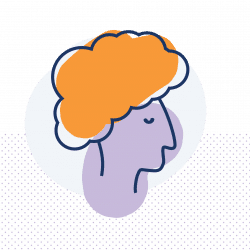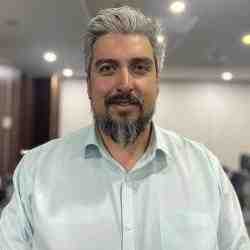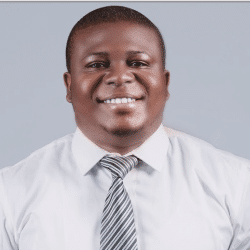Introduction
Despite being a well-developed democracy, Germany still struggles to include everyone in politics and set and maintain a long-term political agenda for the most critical societal issues. Maximilian aims to shake the whole system from the bottom up by training and involving young people and diverse communities in politics. He also creates safe spaces for existing political actors and the civil society that promote mutual collaborations, making political parties shift their agenda from short-term wins to long-term progress. This new system will not only work for the good of all but will also engage all at various levels of politics to strengthen democracy.
The New Idea
Maximilian Oehl is anchoring a significant and timely culture shift in Germany’s multi-party political system that breaks down current ways of hierarchical, closed, and top-down thinking in formal political institutions and builds trust across politicians, parliament, political agendas, and sectors. He envisions a new type of politics that moves beyond short-term electoral and party interests, and instead develops future-directed and issue-led ideas and approaches focusing on the good of all. To achieve this goal, Max creates new pathways for talented, passionate young political leaders to reform old structures and modes of thinking by building and empowering cross-party political alliances. What has begun as an initiative to improve participation for underrepresented groups in the German political landscape has grown into a national movement, Brand New Bundestag (BNB), dedicated to making politics more inclusive and progressive.
The first element of Max’s new idea is to scout and support the new political talent of diverse backgrounds who wouldn’t get involved in politics otherwise. Drawing inspiration from the USA’s Brand New Congress model, Max works in collaboration with local actors to find and prepare new talent to run for the parliament roles. For this part, Max finds a new pathway for youth engagement and works closely with young volunteers. These are the high school and university students who have an interest in changemaking but could not find a way to change the political landscape. Such youngsters often take part in civil society but never imagine they could be the driving force behind the selection of the next cohort of lawmakers.
On the second level, Max does not stop at recruitment but also works on building bridges across political parties to counter polarization. He does that by selecting the top 50 progressives from all parties and connecting them to each other and civil society. Aiming to break down the barriers between opposing politicians as well as the civil actors in Germany, Max creates an extensive network across the country to support progressive politicians. This step also increases the trust between the politicians and other sectoral agents, so that they can work on their shared agendas.
Max sees an urgent need for political parties to harness the momentum of non-traditional political mobilization and the power of young political talent who could channel this energy into the German parliament. Acting as a bridge between grassroots movements and civil society on the one side and political parties and state institutions on the other, BNB has taken on a unique role in the German political landscape, a role that strategically fosters dialogue and collaboration at the institutional level.
The Problem
European voters are increasingly disenchanted with mainstream political parties, which they see as ineffective, elitist, and out of touch. There have been reductions in the number of people who strongly identify with a particular party or along a left-right axis, with a trend for citizens to feel their political opinions are unrepresented. This is particularly true for young people, of whom 73 percent view democracy as unresponsive to their needs . The distance between voters and the political elite is seen to contribute to the rise of populism and anti-democratic attitudes. Populist movements which claim to offer an alternative thrive when mainstream political parties are in crisis, with devasting consequences for democracy.
Political parties have historically been exclusionary and patriarchal institutions that pose formal and informal barriers to the political participation of currently underrepresented groups, such as youth, women, and immigrants. In the current Bundestag, the German federal parliament, only 34.7 percent of representatives are women; the share of parliamentarians with a migration background is 11.3 percent, and the average age of a political party member is 60 years.
In the German political system, political parties are the gateway to political office. Political leaders with influence over nominations control who is placed on an electable list position. Often, long-standing party leaders harbor reservations or suspicion of the entry of new groups (i.e., immigrants) because they fear losing power or may hold prejudicial views. As a result, internal party organization and thereby, political agenda-setting are generated, shaped, and constrained by traditional power structures. Young(er) and new(er) party members who are motivated to innovate and reform experience substantial backlash from informal elite networks and become discouraged. Moreover, because political party affiliation is seen as more important than personal competencies, expertise, or the issue at stake, and there is a lack of cooperation between political actors across party lines. This frequently leads to policy deadlocks caused by competing party interests.
Without early party-political socialization, these groups often do not have the necessary networks, language skills, knowledge of the structures, or habitus that are important in political life. At the same time, there are few systemic orientation measures like mentoring, welcoming, or training programs to facilitate access to political posts and help new party members understand the party structure, party issues, or policies. As a result, many people who bring underrepresented perspectives in the political arena withdraw very quickly from party involvement due to fear and/or experience of dominant group backlashes worsened by a lack of peers or role models for support and allyship.
The lack of diverse perspectives in the current political system not only weakens the quality of democratic and political processes but also leads to a loss of trust in democratic institutions, particularly from those groups who do not feel adequately represented. This explains low voting turnout, i.e., among migrants, which was around 20% below the average during the last federal elections. Politicians are incentivized to pursue policies benefiting their constituents while disregarding the needs and demands for progress and transformation by these groups. A vicious cycle is created.
At the same time, many political parties in Europe face a shrinking membership base because of a general disenchantment with politics. For young people, in particular, political parties often seem unattractive and appear closed, homogenous, or “elitist” organizations. Instead, protests, social movements, and civil society organizations often serve as their vehicle to express grievances and channel political engagement. Political parties, however, are not responsive to popular movements and social protests and view them as rivals. According to a study by the Berlin think tank Das Progressive Zentrum in cooperation with the Friedrich-Ebert-Stiftung, based on interviews in structurally weak regions, people do have a great deal of trust in democracy as a form of government, including in its transformation potential, but they do not trust the politicians currently in office to lead this.
Political parties have become more polarized in the last decade. In Germany, there is an increase in disagreements among political parties over fundamental issues such as climate change, immigration, and European integration, making it difficult to achieve the consensus needed to carry out structural reforms. This can partly be explained by the fact that political positions on some issues have become aligned with the ideology (i.e., conservatives rejecting immigration). Radical populist parties advocating extreme policy positions and, at the same time, nourishing distrust toward traditional parties drive political camps even further apart.
The Strategy
Brand New Bundestag acts as a bridge between social movements and electoral politics. The overarching goal is to build a coordinated political front of progressive forces from different actors and social groups, intertwine grassroots activism and formal electoral politics, and redesign political processes towards more inclusiveness, sustainability, and future orientation. To reach this aim, Max’s strategy works on two levels – grassroots and institutional.
The first part of Max’s strategy is to activate a new generation of political changemakers, who are equipped and empowered to participate in politics. Therefore, he developed a grassroots engagement and talent scouting model, which is effective and simple to roll out nationwide. By initiating nationwide nomination campaigns, BNB scouts for diverse political talent that is traditionally underrepresented in political institutions. Thanks to its close ties to grassroots activists and groups, BNB is able to reach diverse communities across Germany and build political power from the bottom-up. After a thorough screening process, identified candidates go through a multi-stage assessment process with a diverse jury of prominent activists selecting the best-fitting candidates. There is no strict requirement regarding political affiliation, however, all selected finalists must agree with certain future-oriented policy positions on climate, social justice, sustainable business, and the future of Europe. Other important characteristics of successful participants include strong motivation, integrity, and a civil society engagement track record.
Once selected, BNB provides them with the training and support needed to stand as candidates for a party in the next regional or national elections. This ranges from strategic consulting, rhetoric workshops, networking events, and crowdfunding to press outreach. Max has strategically built trust and relationships across all political parties, which positions BNB as a source of new political talent and a bridge to grassroot civil society voices. Through his close links to party member elites, Max is able to advocate for BNB candidates internally. In doing so, he assists political parties in a mutually beneficial way to enhance the chances of success for BNB candidates, in particular, and more diverse political candidates in general.
In order to scale up these efforts, Max is creating a strong volunteer network of young people aged 18-30 who organize and conduct election campaigns for BNB candidates. By participating in BNB, young people are offered a new, low-threshold form of political engagement that not only gets them interested in politics but enables them to influence political processes actively. Moreover, the BNB candidates act as inspiration and role models, ensuring young people from similar backgrounds feel encouraged to participate in political life and ultimately make their voices heard. Overall, this will strengthen democratic processes as politics becomes more accessible, transparent, participatory, and diverse, and underrepresented groups are better integrated and represented.
The second strand of Max’s strategy lies in creating an impartial platform for collaboration inside the political structures, which is not based on ideology or party affiliation but rather on shared values and progressive motivations. Elected BNB candidates are at the core of this network, who call themselves the “BNB squad.” By employing joint strategies and engaging in common positioning for progressive, bold, pragmatic, and human-centered policies, the Squad leads by example in its commitment to greater collaboration and trust-building across political parties. To spread the reach of this fresh approach to a critical mass of politicians and connect the Squad to the broader German party political landscape, BNB has built a network of carefully vetted politicians from various political parties who are identified and recognized for their future-directed political action and thinking. Calling this group the “Top 50 Progressive”, BNB uses this exemplary list to showcase progress-oriented positions inside and across all parties, through broad public campaigns. During regular networking events, BNB brings together this group in an open and agile way to discuss shared political concerns and interests. Through BNB, Max provides a space where they can connect around issues rather than political positions, explore common ground for political action, and ultimately develop more effective policy interventions through collaboration. While doing so, he always ensures that civil society and grassroots groups are represented as well, to mainstream civil society participation in policy development processes. Finally, the Top 50 network gives its members a new sense of identity as a “progressive” politician, next to their primary party affiliation. As such, they become multipliers promoting a culture of tolerance and respect for others regardless of their party, setting new standards for democratic cooperation inside the parliament.
Max recognizes that the BNB talent scout model and the “Top50” group is an entry point for traditional political parties that are struggling to recruit and retain new talent. He knows that to anchor change in the political culture, the change effort itself must have brought positive results to the political parties. Max is growing and empowering a movement of diverse political changemakers, including party members, BNB candidates, civil society actors, and youth, who volunteer to blueprint the future functioning of democratic processes – making it more inclusive, transparent, and participatory – allowing BNB to use their growing publicity to showcase best practices. This position increases pressure on political parties, sending a strong signal that they cannot succeed without opening to diversity and equality if they want to sustain. As they become more aware of their structural deficits, they are encouraged to renew their HR and organizational structures in terms of transparency, participation, and especially the support of new talent from underrepresented groups. At the same time, BNB offers a very low-threshold, innovative form of political participation through the possibility of volunteering, connecting to concrete political candidacies in a non-partisan setting.
Within only two years, BNB has established itself as a recognized and accepted player in the German political landscape. During the first six months, Max managed to build a volunteer-led organization that supported ten selected BNB candidates during the German Federal election with approx. 200 volunteers. BNB creates an experience for these volunteers, where they can play an active role in shaping and influencing formal political processes and outcomes that felt previously distant and to them.
Three of the ten candidates (one from the Green party and two from Social Democrats) were elected as parliamentarians and represented marginalized groups in German society. This is considered a great success, given that these candidates had never run for office before. Since BNB started supporting candidates at the regional level as well, two more candidates have entered parliament in North Rhine-Westphalia and Schleswig-Holstein. All candidates stated that without the BNB’s support, they would not have won the election, nor would they have stood for elections in the first place. They also indicate that the close connection to civil society throughout the election campaign has impacted how they hold their political office today (i.e., working closely with civil society actors). Moreover, references, including a long-standing member of the German parliament, have confirmed that through the “Top50 Progressive” network, they have retrieved their self-efficacy as political leaders, built trust relationships with party members of the opposition, and already started building new cross-party alliances. Moreover, the BNB campaign has helped their standing inside their own political party. The meeting with the Top50 Progressives deputies, which now regularly takes place every third week of the session, is constantly well attended. Diverse representation within the German federal parliament was widely discussed during the electoral campaign up to the federal elections in 2021, with Max/BNB featured in various interviews and press pieces on the matter.
Since the successful implementation of the BNB talent scout model during the German Federal election in 2021, Max has scaled nationally. The model is now replicated at the federal state and local levels to support and connect political candidates in elections. In the medium term, Max envisions establishing decentralized “BNB communities.” The current BNB organization would serve as an umbrella organization that provides strategic and organizational guidance for local sub-chapters that build local ecosystems of political leaders, civil society, etc.
BNB carried out a successful crowdfunding campaign, reaching over 1700 supporters, in May/June 2022. A petition launched by BNB and members of the BNB Squad on term limits for MPs now have almost 75.000 signatories. These examples provide further evidence for the continuous growth of the BNB community and respective future potential. For his work, BNB received the EngagementGewinner 2021 award by the German Foundation for Commitment and Volunteering. They were nominated for the German Demography Award (Category “Lived Diversity”) and the German Engagement award.
In the long term, Max envisions replicating his model in other European countries and has been already approached by international civil society actors in this regard. Max sees BNB’s role in providing strategic guidance and know-how for other countries in establishing corresponding structures and building a network around them. Together this network would grow into a European movement that could, ultimately, help revitalize the vision of a “fit-for-the-future” European Union.
The Person
Being the son of a single mother in Germany and finding the chance to spend a year in Ghana when he was 18, Max became aware of social injustices at an early age. The issues of his growing up years were so different from the Ghanaians, yet the root causes seem similar. The rules of the game were set by the most privileged in both regions, and often the underprivileged were unaware of their rights to enter the system.
He decided to study law because he wanted to learn the "language of the system" to be able to change it from the inside. In 2013, while studying law in Cologne, he founded with a group of friends, the first student-organized Refugee Law Clinic (RLC) in Germany – a student-run legal counseling service for migrants and refugees. His motivation was to help refugees access the services and rights they were given but not informed about. This model spread quickly. By 2015, more than 30 RLCs had been established across Germany. He then combined this growing network into a federal association, RLCs Deutschland e.V., of which Max was the founding chairman.
Max became increasingly involved in politics in his role as an advocate for migration policy. In the process, he became aware of the overall context: whether civil society initiatives are impactful depends on the openness and progress-oriented mindset of the respective politician. In most cases, they never translated into concrete legislative action. Because he could not accept this, he decided to get involved in party politics. Shortly after joining the Social Democrats, he became disillusioned with how little room for change and transformation was within the rigid structures of party politics. When he watched a documentary about Brand New Congress in the U.S. in 2019, his scattered ideas came together to form one big movement: Brand New Bundestag.




